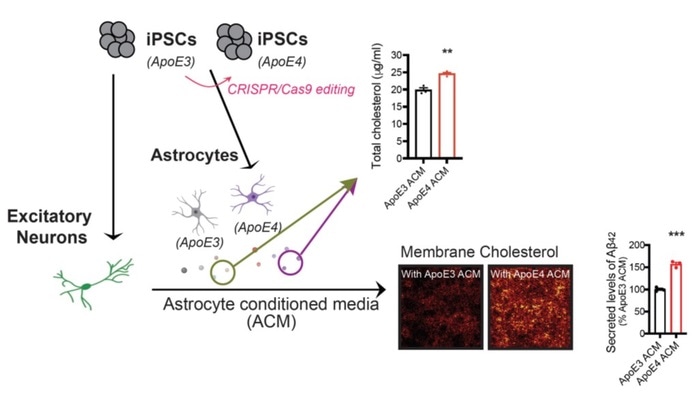Reviewed by Dan Hutchins, M.PhilAug 31 2021
Recent research has revealed higher cholesterol supply from astrocytes to neurons in the model of Alzheimer’s disease (AD) brains, implying that modulating brain cholesterol can be investigated in pursuit of treatment options for the destructive, degenerative disease. The study has been published in the Stem Cell Reports journal.

Cholesterol oversupply from ApoE4 astrocytes promote Aβ production in neurons. Image Credit: Jinsoo Seo.
AD, the most common cause of dementia, affects around 24 million people globally. As the treatment options are very limited, researchers are on the lookout for means to get a better understanding of the disease. A key characteristic of AD is the formation of so-called beta-amyloid plaques, clumps of beta-amyloid protein accumulating in the brain and considered toxic to adjoining neurons.
The reasons for Alzheimer’s disease and the development of beta-amyloid plaques are still not known much; however, genetic research works identified that a gene named APOE, which is involved in cholesterol metabolism and transport, is connected to AD in the elderly. The APOE gene prevails in various versions in individuals, APOE2, APOE3, and APOE4, however. But with the APO4 gene, the risk of developing AD is higher.
Interestingly, it is mainly the supporting cells called astrocytes and not the neurons that make ApoE protein in the brain. To analyze if the APOE4 gene in astrocytes is associated with AD, Jinsoo Seo and co-workers from the Daegu Gyeongbuk Institute of Science and Technology (DGIST), South Korea, employed human-induced stem cells carrying varied versions of the APOE gene to create astrocytes and neurons in the lab, and to analyze their interaction.
The team observed that astrocytes carrying the AD-associated APOE4 gene discharged more cholesterol than astrocytes with APOE3.
The researchers observed that the neurons exposed to increased cholesterol had obvious changes to their cell membranes, the outer layers of the cell which generally consist of cholesterol. Moreover, this increased cholesterol content in cell membranes was directly related to the high production and secretion of beta-amyloid by the neurons.
This study depicts the influence of various versions of the APOE gene in astrocytes in beta-amyloid production in neurons, and how cholesterol oversupply from ApoE4 astrocytes boosts the development of toxic beta-amyloid plaques in AD patients.
Source:
Journal reference:
Lee, S.-I., et al. (2021) APOE4-carrying human astrocytes oversupply cholesterol to promote neuronal lipid raft expansion and Aβ generation. Stem Cell Reports. doi.org/10.1016/j.stemcr.2021.07.017.